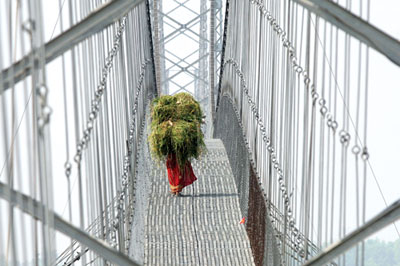 KIRAN PANDAY BRIDGE OVER TROUBLED WATERS: A woman crosses the Mahakali on the western border of Nepal |
After listening to a range of opinions on what his party had to do, Dahal promised the UCPN (Maoist) was willing to proceed with compromises on the peace process and constitution-writing. This included placing the PLA under control of the Special Committee, disbanding the YCL barracks within a few days as required, and resolving disputes related to the constitutional draft.<
To the cynic, this would seem to be merely another ploy to mollify Kathmandu's business and intellectual elite, who were simultaneously emboldened by last Friday's peace assembly and offended by Dahal's attack on them the following day. Indeed, Sher Bahadur Deuba was quick to respond to Dahal on Thursday with a "we will believe it when we see it" response.
But it is clear that the Maoists are on the back foot, and more amenable to a deal than before the general strike. "This is positive, because the main obstacles to the peace process and constitution-writing have in fact been put up by the Maoists," says journalist Kanak Mani Dixit. "Despite the Maoist bluster of not talking with the government, there have been relentless backroom parleys over the last week that have taken us closer to a package compromise than ever before."
It was thanks to the hardliners that the party went in for the indefinite general strike, not heeding the advice of leaders like Baburam Bhattarai and Barshaman Pun. This adventurism, akin to the commander-in-chief episode of a year ago that forced the Maoists to exit government, served to dramatically weaken the Maoists. Their cadre is disgruntled, and the party leaders are seen to have buckled to the peaceniks and the international community, especially big-brother India.
Equally, the solid alliance between UML and NC leaders to resist the Maoist attempt to force a government change through street protest is credited with forcing Dahal to pull back, added to the Kathmandu public's refusal to heed his call to join in, and the danger of a snowballing backlash countrywide.
There are two sticking points as we go to press. First, the ruling alliance of 22 parties is unwilling to concede to the Maoist demand for a quid pro quo in the form of the resignation of the government in response to the Maoists calling off their general strike. Prime Minister Madhav Kumar Nepal is in a mind to leave once the peace process deal is sealed, after which he will formally propose extension of the Constituent Assembly's term.
The main disagreement revolves around the immediate fate of the ex-combatants in cantonments. The other political forces want the Maoists to specify a number for security force integration, and will consider between 3,000-7,000. The Maoist leaders would rather that all 19,000-plus ex-combatants be considered for integration, with a final selection made according to the existing standards of the Nepal Army, Armed Police and Nepal Police.
There is a detailed agreement document of a couple of pages doing the rounds, worked out by NC and UML leaders, and what is needed now is further parleys and the Maoists signing on. We are closer to an agreement than the political static would have us believe.
READ MORE:
Edging closer? - By Dewan Rai
Relief and despair - Publisher's note
Less revolting - BY Kiran Nepal
Letting go - By Prashant Jha


